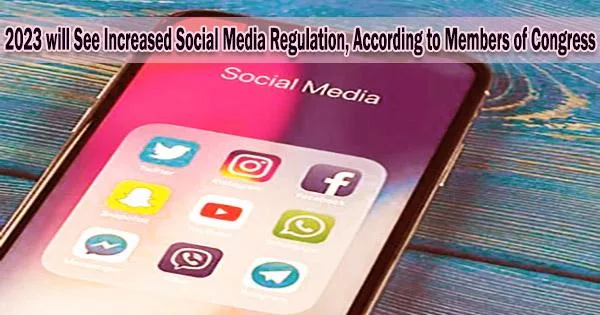# It is important to note that social media regulation is a complex issue that involves balancing the need to protect individuals’ rights and safety online with the freedom of expression and the ability of social media platforms to innovate and operate.
Legislators and advocates say they want to further restrict social media businesses in the New Year, days after Congress passed a bipartisan funding bill prohibiting TikTok from federal devices.
More than 1 billion people use the Chinese business ByteDance’s video-sharing app TikTok each month. TikTok’s ownership structure has raised concerns from lawmakers and FBI Director Christopher Wray because businesses with Chinese legal bases are obligated to provide user information upon government request.
TikTok has repeatedly said its U.S. user data is not based in China, though those assurances have done little to alleviate concerns.
Rep. Mike Gallagher, R-Wisc., compared TikTok to “digital fentanyl” on Sunday, telling NBC’s “Meet the Press” that he thinks the ban on the app should be expanded nationally.
“It’s highly addictive and destructive,” he said. “We’re seeing troubling data about the corrosive impact of constant social media use, particularly on young men and women here in America.”
Facebook whistleblower Frances Haugen said Sunday that since social media platforms like TikTok, Twitter and YouTube operate using similar algorithms, regulators should push for more transparency about how they work as a first step.
Haugen said she thinks most people are unaware of how far behind the U.S. is when it comes to social media regulation.
“This is like we’re back in 1965, we don’t have seatbelt laws yet,” she told NBC’s “Meet the Press.”
In 2022, Congress was unable to enact many of the most aggressive tech-related legislation, such as antitrust legislation requiring Apple and Google to provide developers with more payment options for their apps and a bill requiring new safety measures for children online.
This year, Congress made more progress than in previous years in passing a compromise measure on national privacy standards, but only a patchwork of state laws currently govern how consumer data is secured.
Sen. Amy Klobuchar, D-Minn., said bipartisan support exists for many of these bills, and many have made it onto the Senate floor. But she said the tech lobby is so powerful that bills with “strong, bipartisan support” can fall apart “within 24 hours.”
Klobuchar said on Sunday (January 1, 2023) that things are only going to change with social media companies when Americans decide they have had enough.
“We are lagging behind,” she told NBC’s “Meet the Press.” “It is time for 2023, let it be our resolution, that we finally pass one of these bills.”
















